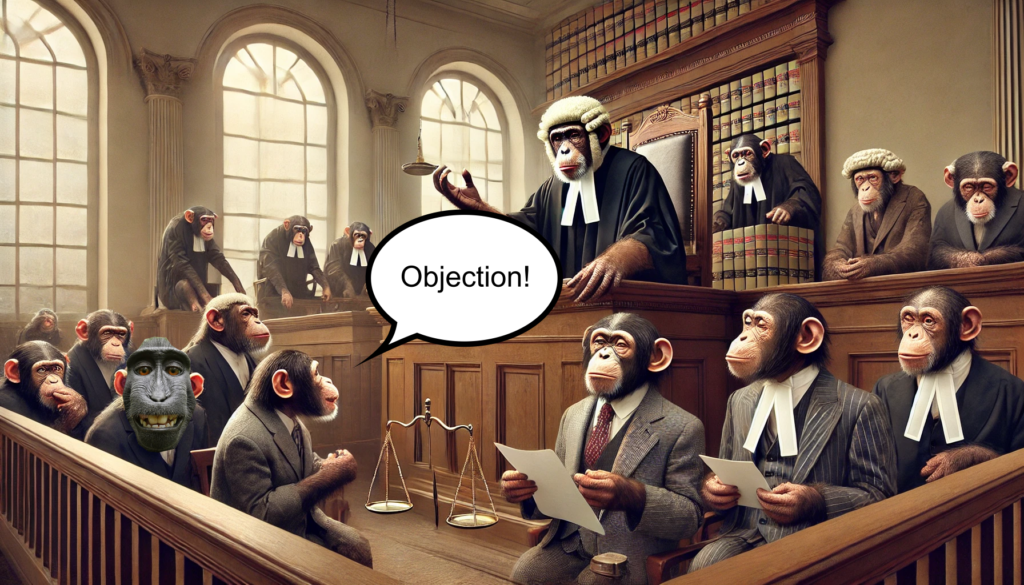Following our article on authorship of copyrighted works by non-humans (which you can find here), today we’re diving into a curious case in which a monkey’s grin almost made copyright law go completely bananas.
Monkey See, Monkey Do
It all began in 2011, when British wildlife photographer David Slater ventured to a natural reserve on the island of Sulawesi, Indonesia, with the purpose of capturing close-up photographs of crested macaques.
After mingling with the elusive monkeys for a couple of days, and several failed photograph attempts, Slater decided to take a different approach: he prepped his camera and left it unattended, hoping to get a reaction from the monkeys. Against all odds, Naruto, a seven-year-old black crested macaque snapped several pictures of himself, which later became to be known as the infamous “Monkey Selfies”. After hitting the jackpot, Slater and Blurb Inc. (Blurb) published a book In the United States featuring the Monkey Selfies, noting Slater and Wildlife Personalities, Ltd. (“Wildlife Personalities”) as the copyright owners. Here are some of the cheeky Monkey Selfies:

The Monkey’s Next Friends & a Copyright Infringement Claim
Not long after Naruto’s grin captivated audiences worldwide, both Antje Engelhardt, a primatologist and the People for Ethical Treatment of Animals (“PETA”) took action in 2015 by filing a complaint for copyright infringement against Slater, Blurb and Wildlife Personalities (the Defendants), acting as Naruto’s next friends.
In Naruto v. David Slater et al., PETA argued that the macaque “had the right to own and benefit from the copyright in the Monkey Selfies in the same manner and to the same extent as any other author”. The suit contended that the defendants had displayed, advertised, reproduced, distributed, offered for sale, and sold copies of the Monkey Selfies for profit without Naruto’s authorization, contravening articles 106 and 501 of the US Copyright Act. The claim requested the following:
Declaring Naruto to be the author and copyright owner of the Monkey Selfies with all attendant rights and privileges under the law;
Restraining the Defendants from copying, licensing, or otherwise exploiting the Monkey Selfies;
Requiring the Defendants to account for all proceeds, expenses, and profits related to Naruto’s copyright infringement by the unauthorized use of the Monkey Selfies; and,
Permitting the next friends to administer and protect Naruto’s authorship and copyright of the Monkey Selfies.
To back the claim, PETA claimed that Naruto authored the Monkey Selfies by his independent, autonomous actions such as manipulating Slater’s unattended camera and purposely pushing the shutter release multiple times. The next friends recognized that even though claiming authorship for a non-human could be “novel”, the concept of “authorship” under the US Copyright Act was sufficiently broad to extend protection to any original work, Monkey Selfies included. But was it? Could a non-human (let alone a monkey) truly hold the copyright of a work it created?
Slater responded by filing a motion to dismiss the claim arguing that the US Copyright Act did not grant non-humans standing to sue for copyright infringement.
The Monkey Suit Goes to Court
Despite having much to discuss about copyright arising from non-human authored works, the district court focused mainly on Naruto’s standing. After all, a black crested macaque fighting for IP rights was unheard of.
The court explained that to establish next-friend standing, the following had to be proven:
That the petitioner was unable to litigate its own cause due to mental incapacity, lack of access to court, or other similar disability.
The next friend has some significant relationship with and is truly dedicated to the best interests of the petitioner.
The court sided with Slater by ruling that Naruto lacked standing. The court deferred to the US Copyright Office’s compendium regarding non-human authorship, which states that an original work of authorship can be registered as long as it’s created by a human being.
PETA appealed the decision arguing that the significance of the Monkey Selfies transcended animal authorship as works created by artificial intelligence could eventually be protected as well (today, we know this is not the case, at least in the US and the majority of countries). They contended that copyright protection should be extended to all original works fixed in any tangible medium of expression, as the US Copyright Act dictated. However, the Ninth Circuit Court of Appeals affirmed the district’s ruling, asserting that animals (other than humans) lack statutory standing to sue under the US Copyright Act since “we have no idea whether animals or objects wish to own copyrights or open bank accounts to hold their royalties from sales of pictures”.
Ultimately, the court ruled that animal-next-friend standing is materially different from a competent person representing an incompetent person. Plus, PETA failed to prove a significant relationship with Naruto. On the contrary, its real motivation was to advance its own interests, not the monkey’s.
Monkey (and Non-Human) IP Rights in Canada
There have not been any cases as ludicrous as the Monkey Selfies in Canada to date. However, Canadian Copyright law and Canadian jurisprudence imply that authorship remains a domain exclusive to humans. Nonetheless, this stance could potentially change as the Government of Canada is in the process of amending the Canadian Copyright Act. This could pave the way for acknowledging authorship for non-human entities, such as artificial intelligence… or not.




